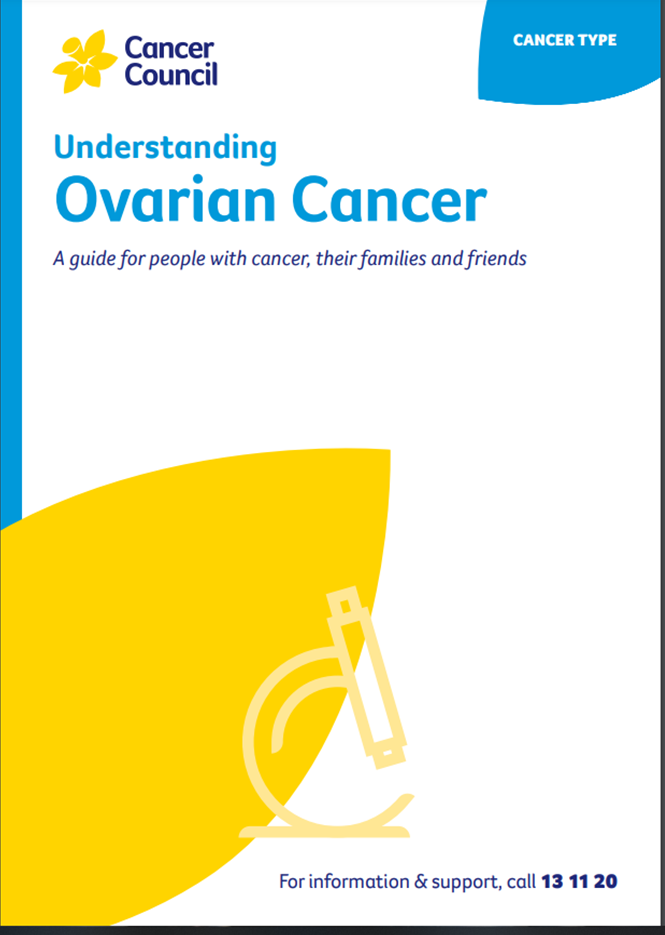- Home
- Ovarian cancer
- Diagnosis
- Your health care team
Your health care team
Your GP will arrange the first tests to assess your symptoms. If these tests do not rule out cancer, you will usually be referred to a specialist called a gynaecological oncologist. The specialist will arrange further tests.
If ovarian cancer is diagnosed, the specialist will consider treatment options. Often these will be discussed with other health professionals at what is known as a multidisciplinary team (MDT) meeting. During and after treatment, you will see a range of health professionals who specialise in different aspects of your care.
To find cancer specialists, multidisciplinary teams and hospitals in NSW or ACT, you can visit the NSW Government website CanRefer.
Health professionals you may see
| gynaecological oncologist | diagnoses and performs surgery for cancers of the female reproductive system (ovarian, cervical, uterine, vulvar and vaginal cancers) and oversees your care |
| medical oncologist | treats cancer with drug therapies such as chemotherapy and targeted therapy (systemic treatment) |
| fertility specialist | diagnoses, treats and manages infertility; may be an obstetrician, gynaecologist or reproductive endocrinologist |
| radiation oncologist | treats cancer by prescribing and overseeing a course of radiation therapy |
| radiation therapist | plans and delivers radiation therapy |
| radiologist | analyses and interprets diagnostic scans, such as x-rays and CT and PET–CT scans |
| cancer care coordinator | coordinates your care, liaises with other members of the MDT and supports you and your family throughout treatment; care may also be coordinated by a clinical nurse consultant (CNC) or clinical nurse specialist (CNS) |
| nurse | administers drugs and provides care, information and support throughout treatment |
| occupational therapist | assists in adapting your living and working environment to help you resume usual activities after treatment |
| women’s health physiotherapist | assists with physical problems associated with gynaecological cancers, such as bladder and bowel issues, sexual issues and pelvic pain |
| exercise physiologist | prescribes exercise to help people with medical conditions improve their overall health, fitness, strength and energy levels |
| dietitian | helps with nutrition concerns and recommends changes to diet during treatment and recovery |
| social worker | links you to support services and helps you with emotional, practical and financial issues |
| psychologist, counsellor | help you manage your emotional response to diagnosis and treatment |
| lymphoedema practitioner | educates people about lymphoedema prevention and management, and provides treatment if lymphoedema occurs; often a physiotherapist or occupational therapist |
| cancer genetics specialist, genetic counsellor | provide advice about genetic causes of ovarian cancer; arrange genetic tests if required and interpret the results for you and your family |
→ READ MORE: Ovarian cancer treatment
Podcast for people affected by cancer
Listen now
More resources
Dr Antonia Jones, Gynaecological Oncologist, The Royal Women’s Hospital and Mercy Hospital for Women, VIC; Dr George Au-Yeung, Medical Oncologist, Peter MacCallum Centre, VIC; Dr David Chang, Radiation Oncologist, Peter MacCallum Cancer Centre, VIC; Prof Anna DeFazio AM, Sydney West Chair of Translational Cancer Research, The University of Sydney, Director, Centre for Cancer Research, The Westmead Institute for Medical Research and Director, Sydney Cancer Partners, NSW; Ian Dennis. Consumer (Carer); A/Prof Simon Hyde, Head of Gynaecological Oncology, Mercy Hospital for Women, VIC; Carmel McCarthy, Consumer; Quintina Reyes, Clinical Nurse Consultant – Gynaecological Oncology, Westmead Hospital, NSW; Deb Roffe, 13 11 20 Consultant, Cancer Council SA.
View the Cancer Council NSW editorial policy.
View all publications or call 13 11 20 for free printed copies.

